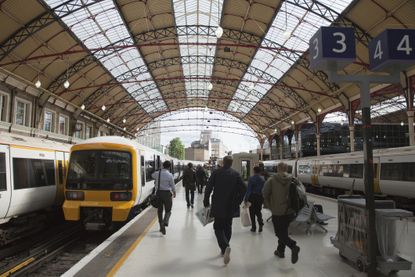Train strikes in July: when are they and how to get a refund
Train strikes look set to take place in July. We explain your rights if you cannot travel and want your money back - and what to do if you aren’t able to make it to a big event


More train strikes are expected to take place this month (July) following a long-running dispute over pay, jobs and conditions, with action set to continue into August.
If you are unable to make your planned trip, then we look at what your rights are and how to claim a refund.
Members of the Aslef and RMT unions from 16 train operators have been striking on several dates so far this year, and new strikes for July have been announced with 20,000 members walking out.
Travel operators have suggested that passengers should avoid rail travel on the affected days where possible, with severe delays and cancellations likely.
When are the train strikes?
Here’s what we know about the planned train strikes in July.
The RMT Union 24-hour strikes are on:
- Thursday 20 July
- Saturday 22 July
- Saturday 29 July
The train operators affected by the RMT strikes on these dates are:
Look After My Bills Newsletter
Get the best money-saving tips, tricks and deals sent straight to your inbox every week. Make sense of your money in partnership with The Money Edit.
- Avanti West Coast
- c2c
- Chiltern
- CrossCountry
- East Midlands Railway
- Great Western Railway
- Greater Anglia
- LNER
- Northern Trains
- South Eastern
- Gatwick Express
- South Western Railway
- TransPennine Express
- West Midlands Railway
Aslef members aren't following RMT with full-day strikes but are refusing to work overtime for six consecutive days this month. The following dates will be disrupted:
- Monday 17 July
- Tuesday 18 July
- Wednesday 19 July
- Thursday 20 July
- Friday 21 July
- Saturday 22 july
- Sunday 22 July
Aslef said there would be a further overtime ban from Monday 31 July to Friday 5 August
The Rail Delivery Group, the body which represents train operators, said the upcoming industrial action would “undoubtedly cause some disruption, affecting not only the daily commute of our passengers but also disrupting the plans of families during the summer holidays”.
Can I get a refund due to the train strikes?
If your service has been cancelled, delayed or rescheduled, you will be entitled to a change or refund from the original retailer of your ticket. You should not have to pay the usual admin fee (up to £10) if you are seeking a refund because of the strike action.
You can also use your ticket with another train company or an alternative route if it is available.
Martyn James, a consumer rights expert, says: “When strikes happen, some train operators may allow you to use your ticket on their services instead. Or there may be rail replacement or emergency services offered instead. Looking at the T&Cs on some train websites, they say they will only pay out if you can’t travel or are delayed when taking these alternative services. I don’t think that’s particularly fair – so get in touch with the train operator before you choose not to travel to find out your refund rights.”
It’s also important to note that you can claim a refund for a season or flexi-season ticket should you be unable to travel.
James says: “The way this is calculated is pro-rata and is rather complex, but again, you can start the process through the train operator website.”
How do I apply for a refund via delay repay?
The process for applying for a refund through delay repay will vary depending on your operator.
In general, you will need to contact the train company online or through the post, including photos of your ticket, season ticket or receipt. You’ll also need to detail the date and time of the train you were intending to catch. This process needs to be repeated for each journey you had planned which has been impacted by the industrial action.
The rules have been adapted to be more generous for season ticket holders ‒ a one-off arrangement allows them to claim delay repay refunds should they opt against travelling on dates of the strikes, even if their train is not cancelled.
Rail companies use a percentage of what season ticket holders paid for their pass to calculate a refund. So if you have an annual season ticket, you get 1/464th of the price back for every ‘single journey’ that needs to be refunded. If you have a monthly season ticket it’s 1/40th of the price while if you have a weekly season ticket it’s 1/10th.
Season ticket holders will receive the refund into their bank account, while those who have an advance ticket will receive an e-voucher to use against the cost of a future rail ticket.
If you are applying for a refund, bear in mind there is generally a time limit of 28 days.
Can I get a refund if I miss a big event due to train strikes?
You are unlikely to get a refund from the train operator should you be unable to make any big event that you have booked as a result of the train strikes.
“You may be able to get a refund if you purchased added insurance when buying your ticket, but often, claiming on these is very difficult as they have so many conditions to meet before you qualify for a refund,” says James.
Your options really are to gift or sell on your ticket. Resale services are offered by some ticket providers, though obviously if you don’t manage to sell the ticket, you miss out entirely.
James adds: “It’s also worth noting that if you booked a hotel and you can no longer get to the event, you should be able to cancel it if there was a 48-hour cancellation policy. So, check your emails to see what you signed up for.”
It’s worth knowing that some hotels and Airbnbs offer free cancellation at any time of the year, up to a short time before your stay. With the uncertainly regarding train strikes, it may be worth looking for this option when booking so you’re not out of pocket.
Can I get a refund for additional costs incurred because of the rail strike?
You won’t be able to claim a refund for any additional costs you may face such as having to pay for a taxi as part of your overall trip or a night in a hotel if you’re unable to get home. National Rail said it won’t cover these additional costs.
Read next

Vaishali graduated in journalism from Leeds University. She has gained experience writing local stories around Leeds and Leicester, which includes writing for a university publication and Leicester Mercury.
She has also done some marketing and copywriting for businesses.
When she is not writing about personal finance, Vaishali likes to travel and she's a foodie.
-
 Three energy firms pay £8m in switching compensation - has your provider paid out?
Three energy firms pay £8m in switching compensation - has your provider paid out?More than 100,000 customers have received compensation after changing providers, but is now a good time to switch energy suppliers?
By Tom Higgins Published
-
 Save £300 on your supermarket shop with cashback accounts
Save £300 on your supermarket shop with cashback accountsBanks, credit card companies and cashback sites are all offering cashback on your supermarket shop, but can you use them all to max out your savings?
By Vaishali Varu Published
-
 Save on petrol: how to save 5p off a litre of fuel at Morrisons
Save on petrol: how to save 5p off a litre of fuel at MorrisonsPetrol prices may have been falling since last summer but every penny counts at the pump. Here’s how to save 5p a litre at Morrisons for a limited time
By Sue Hayward Published
-
 Morrisons relaunches discount scheme with cheaper prices for loyal shoppers
Morrisons relaunches discount scheme with cheaper prices for loyal shoppersMorrisons is the latest supermarket to revamp prices and offers for its loyalty scheme members
By John Fitzsimons Published
-
 Coronation freebies and discounts: what’s up for grabs
Coronation freebies and discounts: what’s up for grabsFrom free railcards and holiday giveaways to discounts off food, we highlight the special offers launched to mark the coronation of King Charles III
By Ruth Emery Last updated
-
 8 ways to get interest-free money if you’re struggling
8 ways to get interest-free money if you’re strugglingHere are 8 clever ways to get interest-free income if you’re struggling with the rising cost of living
By Vaishali Varu Last updated
-
 Best birthday freebies and discounts
Best birthday freebies and discountsEnjoy your special day with these birthday discounts and freebies - we highlight 22 of the best offers
By Vaishali Varu Published
-
 Festival ticket scam warnings – how to protect yourself
Festival ticket scam warnings – how to protect yourselfConcert ticket scams have rocketed by more than 500% over the past year, while festival fraud has more than doubled. Here’s how to keep yourself safe ahead of the festival season.
By Tom Higgins Published
-
 Co-op Member Prices: Supermarket unveils discount scheme for loyal shoppers
Co-op Member Prices: Supermarket unveils discount scheme for loyal shoppersNew Co-op scheme means reduced prices for shoppers who join the co-operative. How much does it cost to join, and how does it compare to similar schemes run by Sainsbury’s and Tesco?
By John Fitzsimons Published
-
 Emergency alert test: what to expect and how to avoid being scammed
Emergency alert test: what to expect and how to avoid being scammedWe tell you everything you need to know about the UK’s first emergency alert test, which takes place this Sunday
By Vaishali Varu Published